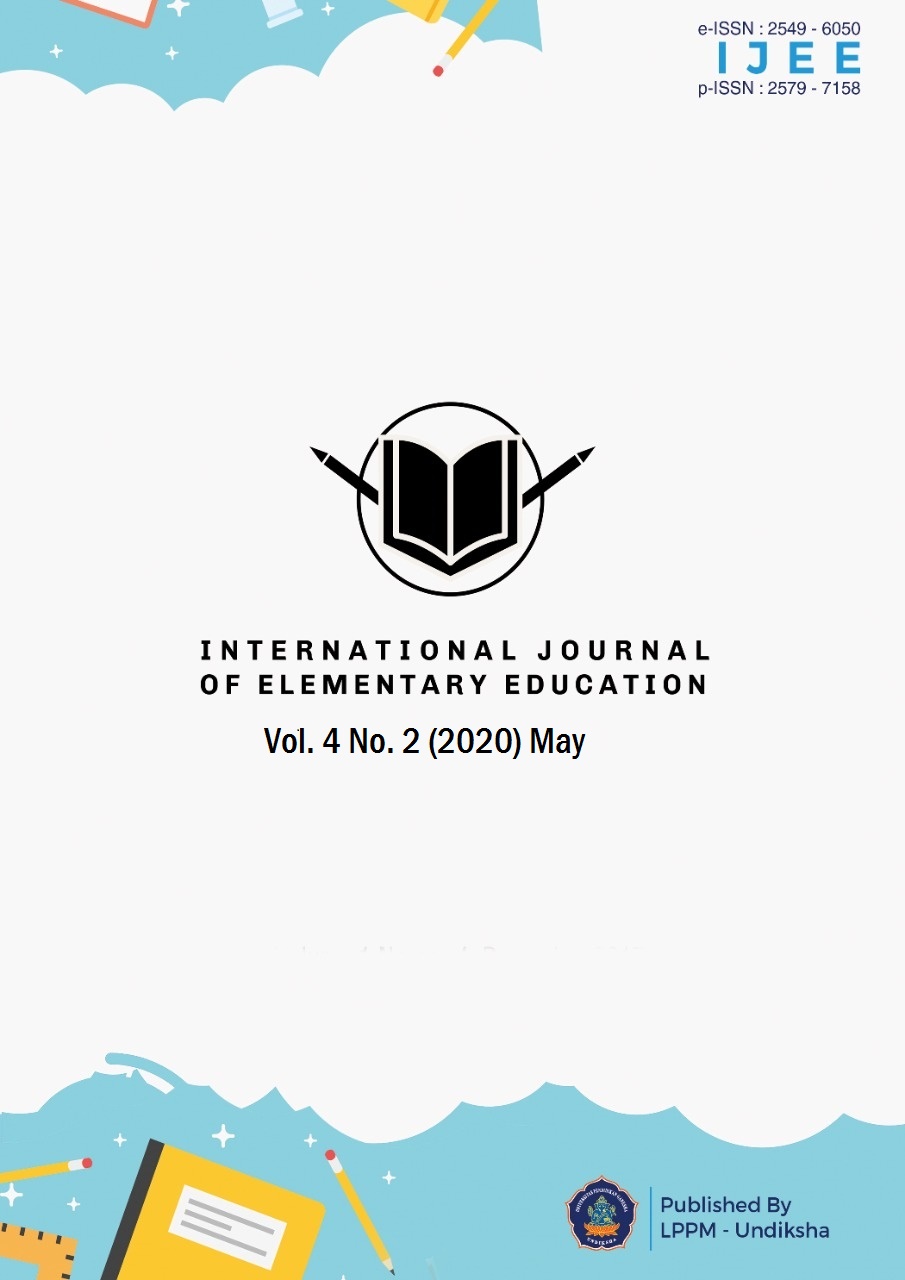The Implementation of Authentic Assessment in Thematic Learning in Elementary Schools
DOI:
https://doi.org/10.23887/ijee.v4i2.25551Keywords:
pedagogical competence, authentic assessment, thematic learningAbstract
The purpose of this study was to determine the teacher's pedagogical competence in the implementation of authentic assessment in the thematic learning of the second grade in SD Negeri (Public Elementary School) Pandeanlamper 01 Semarang. The background was due to teacher difficulty in implementing authentic assessments. The type of study was qualitative research. Data in this study were obtained through observation, interviews, and documentation. The results of this study indicate that 1) teachers and principals know about authentic assessments in thematic learning 2) teachers carry out authentic assessments that include assessment of competency attitudes, knowledge, and skills. The attitude competency assessment was conducted through a journal assessment. Knowledge competency assessment was conducted through written tests and assignment techniques. Skill competency assessment was conducted through product assessment techniques.
References
Alimuddin. (2014). Penilaian Dalam Kurikulum 2013. Seminar Nasional Pendidikan Karakter, 01(1), 23–33.
Ari Astriyandi, Umi Chotimah, E. E. F. (2016). Kemampuan Guru Menerapkan Penilaian Autentik Dalam Pembelajaran Ppkn. Jurnal Bhinneka Tunggal Ika, 3(4), 187–198.
Basit, A., & Wardana, L. A. (2016). Pengembangan Perangkat Asesmen Autentik Dalam Pembelajaran Pendidikan Kewarganegaraan. Jurnal Ilmiah Pendidikan Pancasila Dan Kewarganegaraan, 1(2), 73–78. Https://Doi.Org/10.17977/Um019v1i22016p073
Fitria Wahyu Pinilih, Rini Budiharti, E. Y. E. (2013). Pengembangan Instrumen Penilaian Produk Pada Pembelajaran Ipa Untuk Siswa Smp. Jurnal Pendidikan Fisika, 1(2), 23–27.
Imron, K. & A. (2011). Penerapan Teknik Penilaian Learning Journal Pada Model Pembelajaran Berbasis Masalah Untuk Meningkatkan Hasil Belajar Siswa Materi Pokok Segiempat. Kreano: Jurnal Matematika Kreatif-Inovatif, 2(1), 57–71. Https://Doi.Org/10.15294/Kreano.V2i1.1246
Kunandar. (2014). Penilaian Autentik (Penilaian Hasil Belajar Peserta Didik Berdasarkan Kurikulum 2013). Rajawali Pers.
Mamat Ruhimat. (2018). Kompetensi Pembuatan Instrumen Pengukuran Hasil Belajar Oleh Guru Ips Smp Di Kota Bandung. LENTERA PENDIDIKAN, 21(2), 176–187.
Muttaqin, M. Z., & Kusaeri, K. (2017). Pengembangan Instrumen Penilaian Tes Tertulis Bentuk Uraian Untuk Pembelajaran Pai Berbasis Masalah Materi Fiqh. Jurnal Tatsqif, 15(1), 1–23. Https://Doi.Org/10.20414/J-Tatsqif.V15i1.1154
Novauli. M, F. (2015). Kompetensi Guru Dalam Peningkatan Prestasi Belajar Pada Smp Negeri Dalam Kota Banda Aceh. Jurnal Administrasi Pendidikan : Program Pascasarjana Unsyiah, 3(1), 45–67.
Nurhayati, E., & Ahmad, T. A. (2018). Implementasi Penilaian Autentik Dalam Pembelajaran Sejarah Di SMA Negeri 1 Semarang. Indonesian Journal Of History Education, 6(1), 21–30.
Nurhayati, S. (2019). Pengelolaan Penilaian Hasil Belajar Mata Pelajaran. Jurnal Balai Diklat Keagamaan Bandung, XIII, 154–161.
Sani, R. A. (2014). Pembelajaran Saintifik Untuk Implementasi Kurikulum. Bumi Aksara.
Sani, R. A. (2016). Penilaian Autentik. Bumi Aksara.
Shabir, M. (2015). Kedudukan Guru Sebagai Pendidik: (Tugas Dan Tanggung Jawab, Hak Dan Kewajiban, Dan Kompetensi Guru). Jurnal AULADUNA, 2(2).
Umami, M. (2018). Penilaian Autentik Pembelajaran Pendidikan Agama Islam Dan Budi Pekerti Dalam Kurikulum 2013. Jurnal Kependidikan, 6(2), 222–232. Https://Doi.Org/10.24090/Jk.V6i2.2259
Umi Salamah. (2018). Penjaminan Mutu, Penilaian Pendidikan. EVALUASI, 2(1), 274–293.
Yovi Anggi Lestari Dan Margaretha Purwanti. (2018). HUBUNGAN KOMPETENSI PEDAGOGIK, PROFESIONAL, SOSIAL, DAN KEPRIBADIAN PADA GURU SEKOLAH NONFORMAL X. Jurnal KEPENDIDIKAN, 2(1), 197–208.
Yuni Pantiwati. (2013). Hakekat Asesmen Autentik Dan Penerapannya Dalam Pembelajaran Biologi. Jurnal Edukasi Matematika Dan Sains, 1(1).
Downloads
Published
How to Cite
Issue
Section
License
Authors who publish with the International Journal of Elementary Education agree to the following terms:
- Authors retain copyright and grant the journal the right of first publication with the work simultaneously licensed under a Creative Commons Attribution License (CC BY-SA 4.0) that allows others to share the work with an acknowledgment of the work's authorship and initial publication in this journal.
- Authors are able to enter into separate, additional contractual arrangements for the non-exclusive distribution of the journal's published version of the work (e.g., post it to an institutional repository or publish it in a book), with an acknowledgment of its initial publication in this journal.
- Authors are permitted and encouraged to post their work online (e.g., in institutional repositories or on their website) prior to and during the submission process, as it can lead to productive exchanges, as well as earlier and greater citation of published work. (See The Effect of Open Access)









